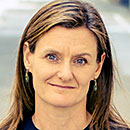What We Do
 Rachel Maguire
Rachel Maguire
Research Director
Since 2006, Rachel has studied the intersecting and interacting forces shaping the future of how we learn, work, play and take care of one another. While her research efforts stem from her deep understanding of health care policy, her foresight work situates the future of health and health care within the context of external forces that are shaping the next decade. Rachel combines the linear trends affecting health and healthcare with larger technological, demographic and economic influences to better anticipate directional change in the future of self-care and clinical care.
Rachel has led numerous public engagements with organizations, including Capital One, Dell Technologies, Robert Wood Johnson Foundation and Philips Healthcare, examining the future of cities, emerging technologies, caregiving, and connected care. In addition, she has worked with dozens of clients to develop strategic foresight to help guide their organizations’ long-term planning. She is skilled in expert aggregation techniques, routinely facilitating workshops and panels of people with diverse backgrounds to discuss and debate future scenarios. To gather firsthand views of changing practices and beliefs, Rachel has designed and conducted ethnographic research on lead users and early adopters in the United States and Latin America.
Rachel has shared her perspective on the future of health and health care at IFTF and client events, as well as at numerous conferences including the Mayo Clinic Transform and Techonomy Health. In 2017, Rachel served as a judge for Celgene’s Innovation Impact Awards. She holds a BA in politics from Oberlin College and an MPAff (master of public affairs) from the University of Texas at Austin.
Making the Future
“This is an exciting time for health care systems across the globe to think about transformation. Social and technological forces are uprooting long-standing practices, processes, and paradigms in health care, opening the door to new approaches to extending ‘healthspans’ and supporting well-being. Amid the uncertainty and volatility in health care today, futures thinking and forecasting are essential tools for enabling health care delivery systems to better prepare for a constantly evolving health and well-being landscape.”



